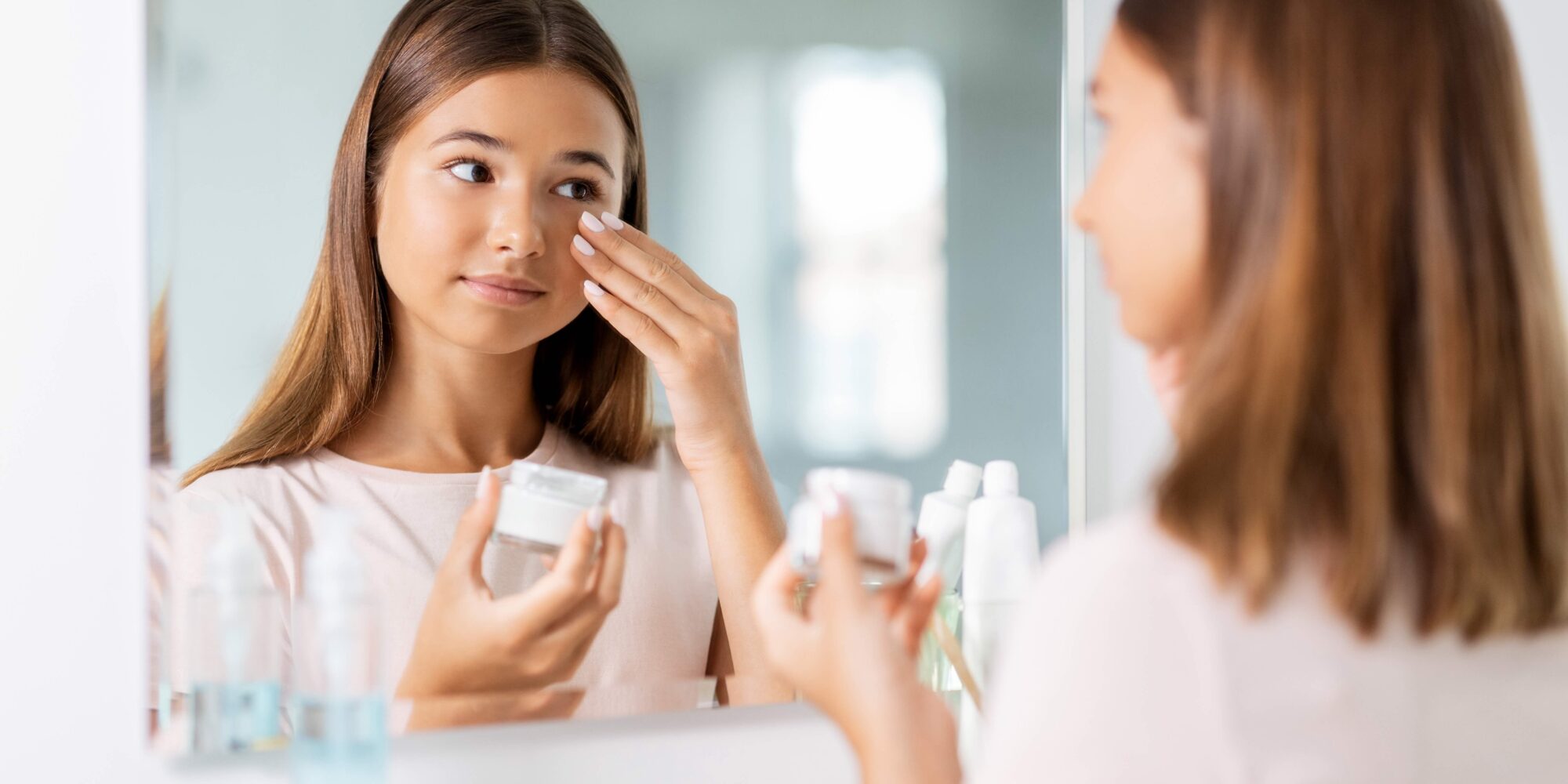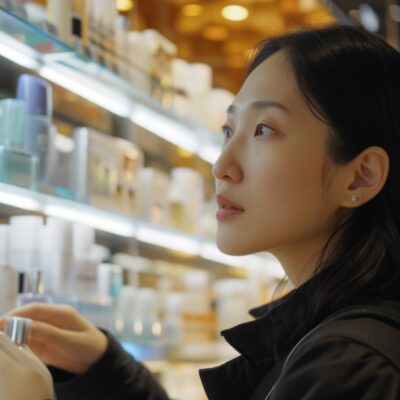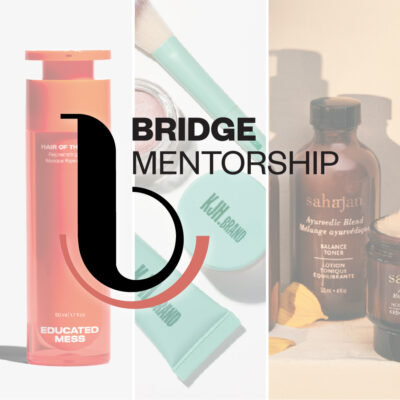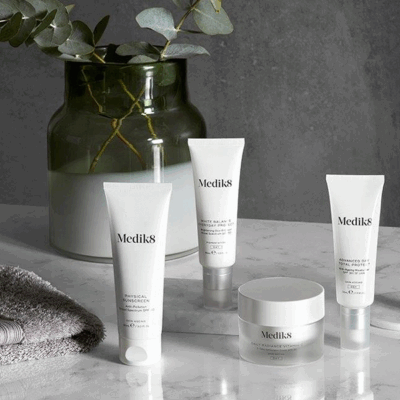
Should Kids Be Legally Barred From Buying Adult Skincare?
Alex Lee, a member of the California Assembly, has introduced a revised version of a bill that, if passed, would ban the sale of anti-aging skincare products with harsh ingredients to people under the age of 18 in the state. Specifically, the bill names vitamins A and C, and alpha hydroxy acids as among harsh ingredients in skincare products it seeks to get out of the hands of children.
In an Instagram post, Lee said, “Kids have more sensitive skin than adults. These powerful active ingredients can be harmful, causing issues like skin irritation and increased sun damage. And, clearly, it’s a ridiculous paradox that kids need anti-aging products in the first place, they’re kids.”
An earlier version of the bill failed last year, but there’s been increased activity from retailers, brands and jurisdictions sounding the alarm about kids and potent skincare. Swedish pharmacy chain Apotek Hjärtat has placed a minimum age limit of 15 years old for purchases of skincare products with active ingredients without parental consent, and Connecticut attorney general William Tong has warned parents to exercise caution around anti-aging products marketed to children.
In light of the momentum for steps to prevent kids from obtaining adult skincare, for the latest edition of our ongoing series posing questions relevant to indie beauty, we asked 15 beauty entrepreneurs and executives the following: Do you think age-gating should be legally mandated for skincare purchases? What alternative solutions, if any, should be pursued inside and outside of the beauty industry?
- Brooke Jeffy Founder and Dermatologist, Btwn
I wish it did not need to be mandated, but as a dermatologist very involved in the Sephora kid world and founder of tween and teen skincare brand, Btwn, I see the negative consequences of inappropriate product use routinely. I am talking about breakouts and rashes in kids who had normal skin prior to using products too harsh for them.
These kids are already struggling with their appearance and confidence, and these very visible reactions on their skin only worsen their mental health, not to mention how the damage to their skin barrier from some of these products may actually accelerate the loss of collagen that many anti-aging products seek to improve. The absolute best thing a child can do for anti-aging is sun protection, so sunscreens plus keeping the skin clean and hydrated is what the messaging to kids should be.
But because the viral brands in this space are not spelling this out for kids and their parents, I support putting some safeguard in place. Some kids do need these ingredients, especially retinoids, to treat acne, but I support the idea of needing a parent to be involved in the purchase.
The bottom line is that parents do not realize how harmful these products can be on young skin and kids are constantly exposed to social media marketing and are demanding these products. There needs to be some mechanism in place to educate parents so they can keep their kids safe. The only alternatives I can see are age labeling requirements or some educational flag at the point of sale, but then the onus is on retailers and brands which is going to go against profits.
- Sabrina Yavil Founder, Gryme
While I agree with the intention behind Assemblymember Alex Lee’s bill, putting the responsibility on retailers to enforce age restrictions is unrealistic and likely ineffective. It would require extensive staff training, added operational costs and turning away customers, which could harm customer relationships and be difficult to enforce consistently. Unless there’s a well-funded plan for oversight and accountability, this type of legislation feels more symbolic than actionable.
That said, if retailers voluntarily choose to implement higher safety standards and limit sales of inappropriate products to minors that would be a welcomed and refreshing change. But to mandate it universally without addressing deeper issues within the beauty industry misses the bigger picture.
The real problem isn’t only access—it’s that kids’ personal care products aren’t held to higher safety standards in the first place. Children’s skin is thinner, more vulnerable and still developing, making them more susceptible to irritation, barrier disruption and endocrine interference. Yet, there’s no clear consensus on what’s truly safe for them, and the long-term effects of many ingredients on young skin remain unknown.
Here’s what should be happening:
- Higher safety standards for products marketed to kids and teens, stricter than what’s accepted for adults because developing skin requires greater protection.
- A standardized, industry-wide list of "no-go" ingredients for kids covering not just harsh anti-aging actives like retinoids and strong acids, but also endocrine disruptors, allergens and barrier-damaging ingredients.
- Stronger labeling and transparency requirements so parents can make informed choices and aren’t misled by terms like “clean,” “gentle” or “dermatologist-developed” that don’t always reflect true safety.
- Full disclosure and transparency of fragrance ingredients. Fragrance suppliers must be transparent with brands about what’s in their formulations. Hiding behind "trade secrets" prevents parents and consumers from knowing whether a product contains potential allergens, hormone disruptors, or other harmful ingredients. Kids should never be unknowingly exposed to those risks.
- More education for parents since most parents don’t realize that many products they trust for themselves aren’t appropriate for their children.
Retailers should want to protect their customers, especially children, and those that voluntarily adopt higher safety standards will become trusted partners for parents. But placing the entire enforcement burden on them without solving broader industry problems is not the right path.
This is exactly why I created Gryme, a rigorously formulated, consciously sourced personal care brand for preteens and teens. At Gryme, if an ingredient is known or even suspected to be harmful in adults, we don’t use it in products for kids. Our standards for young, developing skin are far stricter than what we would accept for ourselves because, when long-term effects remain unknown and unstudied, the only responsible choice is caution.
Ultimately, parents need transparency, brands need to take responsibility, and the industry needs to raise the bar on what’s considered safe for kids and teens. Age-gating alone won’t solve the issue, but clearer labels, higher formulation standards, fragrance transparency and parent education will move us in the right direction.
- Sydney Dake Founder, Gntl
While protecting children from harmful beauty standards and harsh skincare products is undoubtedly important, I believe legally mandated age-gating for skincare purchases may introduce more problems than it solves. It seems inconsistent to ban anti-aging ingredients when children can still freely purchase hair dye, bleach and numerous other potentially harsh products.
More importantly, this legislation doesn't address the primary access point, their parents' beauty cabinets. The real solution is parental guidance and education.
Parents should be taking an active role in researching what skincare products their children are using or interested in. Having open conversations about age-appropriate skincare and monitoring what products enter the home would be more effective than blanket bans that can be easily circumvented (remember being a kid? They're sneaky!).
A more balanced approach might include educational campaigns about age-appropriate skincare and retailer-led initiatives with in-store navigation for kids and teens.
- Jemila Alharazim Founder and CEO, Ocean Olive
Age-gating should be legally mandated for skincare products marketed as anti-aging to children. Children naturally have youthful skin with minimal concerns that require correction, making such products unnecessary for them.
However, products containing vitamin A (retinoids) should be an exception as retinoids play a crucial role in managing acne, which can affect individuals as young as 11 or 12. Skincare for children should emphasize the fundamentals—gentle cleansing and effective moisturization—to establish a healthy foundation as they grow.
- Ellen Kavanagh-Jones Founder, Your Skin Stuff
Of course, children shouldn't be using any type of retins or anti-aging products. We all know that! The gen alpha skincare trend, however, presents an opportunity, not a crisis. While concerns about potent ingredients are valid, we must acknowledge the positive: these young consumers are engaging with self-care.
They want to wash and look after their skin, our bodies largest organ. Many pre-teen parents, myself included, will know only too well the struggle there can be to get your preteen to wash.
The issue isn't solely age-gating, but responsible product development and education. Blanket bans don't address the root cause: the allure of adult-oriented skincare. The appeal lies in the experience, ritual and perceived sophistication.
We must empower parents and children with accurate information. This includes demystifying ingredient lists, explaining sun protection and promoting realistic expectations. Brands and retailers must be trusted sources, not just sales platforms.
Rather than excluding beneficial ingredients like salicylic acid, niacinamide and vitamin C, we must innovate formulations calibrated for younger skin. This involves rigorous testing and transparent labelling. It’s about understanding the unique needs of developing skin, where barrier function is paramount. Products should focus on gentle cleansing, address specific skin concerns and strengthening natural defenses.
The "play" element is critical. We can replicate the sensory appeal of adult skincare with safe, fun and educational products. This could involve innovative textures, gentle fragrances and engaging packaging, using sustainable materials. The product experience is vital.
Retailers must curate age-appropriate selections and provide informed guidance, perhaps with dedicated sections and trained staff. We should not shy away from beneficial, stable ingredients, but ensure they are at safe levels for younger skin, protecting the skin barrier.
Instead of restrictions, let's create a responsible ecosystem supporting gen alpha's skincare journey. By prioritizing education, safe formulations and engaging experiences, we can turn this trend into a positive force for lifelong skin health. This enables preteens to develop healthy habits for life, something we are passionate about at Your Skin Stuff.
- J. Sophia Mendizábal Manager, Brand Marketing, Ya-Man
As a beauty brand leader, I strongly believe that education and responsible marketing are far more effective than strict legal mandates. While protecting younger consumers from potential skin damage is important, age-gating could create more confusion than solutions.
Not all active ingredients are inherently harmful. Vitamin C, AHAs and retinoids can be highly beneficial at the right strengths, but damaging if misused, regardless of age. Many dermatologist-recommended formulations exist for teenage acne and hyperpigmentation, so a blanket ban could limit access to proper skincare treatments.
Additionally, unlike alcohol or tobacco, skincare is not age-restricted globally, making enforcement complicated. Would online retailers need to verify age? Would in-store associates have to refuse sales? The logistical challenges could be overwhelming, and enforcement inconsistencies would create confusion for both consumers and brands.
Rather than banning sales, brands and retailers should focus on age-appropriate education and clearer labeling to help young consumers make informed choices. A better solution is to introduce "Teen-Safe" or "Adult-Intended" labeling on packaging similar to how hair dyes and certain cosmetics carry usage warnings. A “dermatologist-recommended” verification process would be more effective than an outright ban, allowing teens to access beneficial treatments under expert guidance.
Also, retailers could launch teen skincare education programs, similar to how Sephora and Ulta train beauty advisors on skin suitability. Much of this concern stems from viral skincare trends, where influencers promote highly potent actives without proper education. Instead of legal bans, platforms like TikTok and Instagram should maybe introduce content disclaimers on potent ingredient recommendations for young users similar to how brand and product marketers abide by the guardrails of cosmetic versus drug claims.
I fully support protecting young skin, but education—not restriction—is the best solution. Instead of age-gating, brands should take responsibility for clearer labeling, safe formulation guidance, and dermatologist-backed recommendations.
- Sion Owen Founder, Kobi
Kids need hygiene products, not beauty products. Their skin needs gentle cleansing for basic daily hygiene, but it certainly doesn’t need anti-aging treatments or other beauty preparations. Marketing beauty products to kids is just irresponsible.
The root problem here is a perception problem. Kids think they need this stuff because of what they’ve been exposed to online. If we implemented legislation to penalize the brands or individuals marketing beauty products to kids and tightened up age restrictions for beauty content on social media, then this perception would decline and age-gating at the retail level would be less necessary.
- Jamika Martin Founder, Rosen Skincare
Honestly, I think it's notable, but I’m not sure that it should be legally necessary. Generations before us compromised their skin with stripping acne formulas or no sunscreen, but that doesn't mean we made a law against alcohol-based astringents or requiring sunscreen. I think this is a concern that falls on brand and parental education together, not a legal matter.
- Barbara Paldus Founder and CEO, Codex Labs
I believe that skincare marketing has outpaced safety in cosmetics for children, and this is only amplified by social media platforms like TikTok that have no regulations. We age-gate television and movies for psychological impact, so why don’t we age-gate social media and skincare?
After all, tween and teenage skin is not fully mature and can easily burn or scar by using anti-aging products intended for adults. Being a proponent of testing skincare products with actives should only be sold for age groups on which there is safety and efficacy data for that age group.
- Ann Ragan Kearns Founder, Medalist
At Medalist Skin, we’ve always believed in listening to our community and utilizing direct feedback to provide products the next generation of female athletes actually need. We don’t chase trends, we develop products based on the real needs of athletes.
When we surveyed our panel of 500-plus female athletes across all levels, 94% told us their top skincare concerns are acne and dryness, not wrinkles. That’s exactly why we formulate with barrier-strengthening, hydrating and acne banishing ingredients rather than jumping on the latest “anti-aging” bandwagon.
We totally get the concern of age-gating being legally mandated. Younger skin is more sensitive, and powerful actives like retinol, high-percentage acids and even vitamin C in certain forms can cause irritation and increase sun sensitivity, especially for athletes constantly exposed to the elements with their training and competition environment. But legislation isn’t the only answer here, brands need to take responsibility, too.
The real issue isn’t access, it’s education and marketing. The beauty industry has glamorized anti-aging for far too long, even marketing it to teenagers who don’t need it. The paradox is real: Why should a 14-year-old be worried about fine lines when they’re just trying to keep their skin clear post-practice? Instead of bans, we need:
Stronger and transparent ingredient education: Retailers and brands should make it clear which ingredients are appropriate for which age groups rather than using buzzwords to sell products.
Responsible marketing: Brands should stop pushing high-strength actives onto kids who don’t need them.
Formulation with intention: At Medalist Skin, we don’t include ingredients just because they’re trendy. We focus on barrier-supportive, athlete-approved formulations that work with, not against, active skin.
At the end of the day, we don’t believe teenagers should feel pressured to buy anti-aging products in the first place. Skincare should be about supporting and protecting the skin you’re in. That’s why we don’t use retinol, high-percentage acids or aggressive actives in our formulas. Instead, we create athlete-backed, performance-driven skincare designed for what young skin actually needs.
I would love to see the conversation shift away from age-gating and towards better skincare education, smarter formulation and industry-wide accountability.
- Jennifer Norman Founder, Humanist Beauty
I think Alex Lee’s heart is in the right place. However, it is my opinion that it is ignorant of the fact that vitamin A, vitamin C and alpha hydroxy acids are not just anti-aging ingredients, they are skin health ingredients.
Kids and preteens get acne, for example, and these are some of the best ingredients to address that skin condition. I think his bigger concern is putting an age floor on companies marketing anti-aging products to kids, which is valid.
Rather than this type of legislation, which may subversively create demand for the rebellious target market it is intending to serve, I would place responsibility on beauty brands to take care in marketing their products more responsibly.
Legislation to place warning labels on products that are intended for mature skin and that contain potent levels of desquamating or apoptosis-enhancing ingredients can be a viable alternative that makes more sense to me.
- Kimberley Ho Co-Founder and Co-CEO, Evereden
The intent of proposed bills around age-gating or preventing children below a certain age to purchase skincare products with harsh, anti-ageing ingredients is valid as children have thinner and therefore more sensitive skins than adults, so using such products could damage their skin barriers from a young age and cause issues down the line.
However, such bills have challenges in implementation as it isn’t just retinol or certain acids such as AHAs and BHAs that are unsuitable for tweens and children. There is a whole laundry list of ingredients that are too harsh for young skin, which is why we need to address the root of the issue, which is social media and brands selling products that are not made for kids to kids.
That is why at Evereden we create products that are made to be safe specifically for each age group in the whole family. We have lines that are especially designed for teens that addresses changing skin issues as well as products for younger kids that are just starting out with their skincare routines and need a simpler, gentler solution.
- Ruth-Ann Thorn Founder, N8iV Beauty
Aging is a natural process that aligns with the cycles depicted in the Medicine Wheel. The idea of promoting harsh anti-aging products reflects a colonial mindset that conflicts with our indigenous values. Rather than focusing on trying to halt aging, we should nurture healing products that support holistic well-being.
Children’s skin is sensitive, and anything that could potentially cause harm should never be used by anyone! It is challenging to understand the need for such harsh products as they often do more harm than good. Health and safety for should always be prioritized.
- Melodie Reynolds Founder, Elate
I believe that age-gating for anti-aging skincare products is an important step to consider, especially for products that contain potent active ingredients. While there’s no one-size-fits-all solution, regulating skincare products designed for more mature skin and limiting access for minors seems to be a reasonable precaution. Young skin is delicate and using harsh ingredients can cause more harm than good.
That said, I think we should focus on education within the beauty industry and to consumers about the importance of age-appropriate skincare. Instead of outright banning products, I’d support initiatives that encourage parental oversight and informed decision-making. Empowering consumers with the knowledge to make responsible choices will go a long way in ensuring that skincare products are used in a safe and effective manner.
- Rachel Budde Founder, Fat and the Moon
Fat and the Moon has been anti-anti-ageing from the beginning. I’ve always seen anti-aging messaging as just as damaging as the harsh ingredients themselves, for both kids and adults.
Younger generations always mirror our collective desires, insecurities and moral limitations. When what is reflected back disturbs us, it is an opportunity for us to take a hard look at the ways we take part in what we want to protect our kids from.
As a clinical herbalist, part of my work is understanding the evolving dynamic between our physiology and phytochemistry (plant chemistry). Dose is a primary factor in medicine and in skin care to induce an effect on a tissue or function of the body. Vitamins A and C and even alpha hydroxy acids are not intrinsically dangerous, but dose dependent.
Vitamins as part of an array of constituents like the vitamin C present in rosehip seed oil or the acids inherent in fruits like tomato can be both gentle and beneficial to the natural processes of skin sloughing and rebuilding, whereas the use of concentrated versions of these compounds might be appropriate in extreme cases of ichthyosis, for instance.
Rather than focusing on age-gating ingredients, it is more important for us to understand how and why these ingredients get used and if they are necessary or simply leveraging and perpetuating our insecurities? The matter might be better resolved by regulating the marketing which includes anti-aging language.
From my perspective as an herbalist and formulator, I question the efficacy of these anti-aging products because the best way to take care of your skin, like the rest of your body, is to nourish it. This is true at any age. While there may be differences in skin needs because of hormonal fluctuations, harsh over the counter ingredients are never the answer.
Regulating anti-aging ingredients is a Band-Aid solution to a much deeper problem. It is time for the beauty industry to come clean, not just in terms of ingredients, but the insidious and toxic messaging that has long been the shadow of beauty.
If you have a question you'd like Beauty Independent to ask beauty entrepreneurs and executives, please send it to editor@beautyindependent.com.






Leave a Reply
You must be logged in to post a comment.